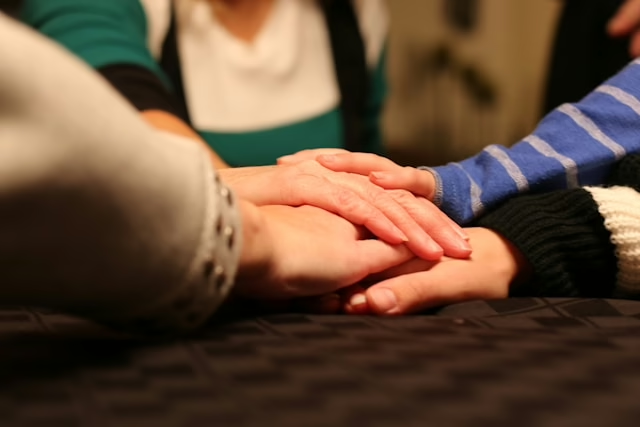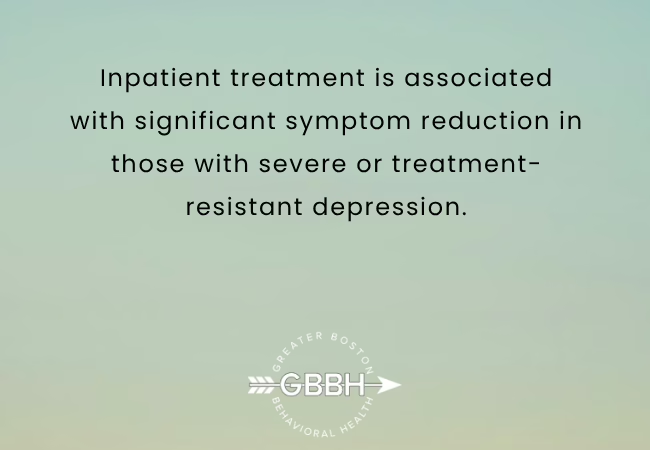Depression is more than sadness—it’s a serious, often debilitating mental health condition that can deeply affect every aspect of life. When symptoms escalate beyond what outpatient therapy or medication can manage, inpatient treatment becomes a critical lifeline.
At Greater Boston Behavioral Health, our Inpatient Treatment Program in Massachusetts offers a structured, safe, and clinically supported environment for individuals battling severe or treatment-resistant depression.
When Is Inpatient Treatment Necessary for Depression?
Inpatient care is designed for individuals who need intensive, round-the-clock support—especially when symptoms include:
- Suicidal thoughts or self-harm
- Severe withdrawal from daily life
- Inability to function at work, school, or home
- Uncontrolled crying spells, hopelessness, or despair
- Co-occurring trauma or substance use
- Medication changes that require close monitoring
Choosing inpatient care isn’t a sign of failure—it’s a courageous, proactive step toward reclaiming mental wellness.
What Happens During Inpatient Depression Treatment?
Our Residential Treatment Program in Massachusetts provides a comprehensive approach, including:
1. Medical and Psychiatric Stabilization
Patients receive 24/7 monitoring, medication management, and immediate interventions when needed.
2. Intensive Psychotherapy
Daily sessions with licensed therapists using evidence-based modalities such as:
- Cognitive Behavioral Therapy (CBT)
- Dialectical Behavior Therapy (DBT)
- Trauma-informed care for those with co-occurring PTSD
3. Group and Peer Support
Sharing experiences with others fosters belonging, empathy, and emotional release.
4. Holistic Therapies
Yoga, mindfulness, art, and movement help reconnect the body and mind in healing.
5. Family Involvement
We encourage loved ones to join family therapy sessions and receive psychoeducation about depression and recovery.
A Typical Day in Our Inpatient Program
| Time | Activity |
|---|---|
| 7:00 AM | Wake-up and morning wellness check |
| 8:00 AM | Breakfast |
| 9:00 AM | Individual therapy (CBT/DBT) |
| 10:30 AM | Group therapy session |
| 12:00 PM | Lunch |
| 1:00 PM | Psychiatric or medication review |
| 2:00 PM | Trauma therapy or anger management support |
| 4:00 PM | Holistic activity: yoga, art, or mindfulness |
| 6:00 PM | Dinner |
| 7:00 PM | Evening reflection or support group |
| 9:00 PM | Wind-down and lights out |
This routine provides both structure and flexibility, helping patients begin to reestablish emotional and behavioral stability.
Understanding Treatment-Resistant Depression
Not all depression responds to standard outpatient therapy or medications. Treatment-resistant depression (TRD) affects an estimated 30% of people with major depressive disorder, making inpatient care essential for:
-
Close medication monitoring and adjustment
-
Introduction of newer interventions (e.g., ketamine-assisted therapy, TMS)
-
Rapid response to risk of suicide or self-harm
-
Multidisciplinary team support that outpatient care often cannot provide
Inpatient programs allow for faster interventions when time is critical.
The Neurobiology of Depression and the Role of Stabilization
Severe depression often correlates with chemical imbalances and neurological dysregulation. Inpatient treatment can stabilize:
-
Cortisol levels affected by chronic stress or trauma
-
Serotonin and dopamine imbalances linked to low mood
-
Sleep and circadian rhythms, which are often disrupted in severe cases
By addressing both biological and psychological components, healing becomes more holistic and sustainable.
Peer Support and Community in Inpatient Settings
Isolation fuels depression. Inpatient treatment offers:
-
Peer support groups to share experiences and reduce shame
-
Therapeutic community living, promoting accountability and connection
-
Structured social interaction that rebuilds emotional resilience
At Greater Boston Behavioral Health, patients report that connecting with others on a similar path helps them feel understood and supported.
Building Long-Term Recovery Skills
The goal isn’t just stabilization—it’s empowerment for long-term recovery. Inpatient treatment includes:
-
Life skills development: time management, nutrition, routine-building
-
Emotional regulation training through DBT and anger management
-
Preparation for re-entry into work, school, and relationships
-
Coping mechanisms for setbacks, anxiety, and depressive relapse
These tools set the stage for successful transitions into PHP or IOP programs in Massachusetts.
How Depression and Trauma Often Intersect
For many patients, depression is intertwined with unresolved trauma. Our Trauma Therapy Program in Massachusetts integrates trauma-informed care into every stage of treatment. This dual-diagnosis approach addresses:
- Childhood trauma or abuse
- Grief and loss
- Post-traumatic stress
- Emotional neglect or relational wounds
Without treating trauma, recovery from depression is often incomplete.
Transitioning After Inpatient Treatment
Inpatient care is only the beginning of a broader recovery journey. We offer seamless transitions to:
➤ Partial Hospitalization Program Massachusetts (PHP)
Structured, full-day treatment without overnight stay.
➤ Intensive Outpatient Program Massachusetts (IOP)
Flexible care three to five days a week for step-down support.
These programs maintain momentum while helping patients reintegrate into everyday life.
Why Choose Greater Boston Behavioral Health?
We’re more than a treatment center—we’re a compassionate, dedicated team committed to helping you rediscover hope. Here’s why individuals trust us for depression treatment in Massachusetts:
- 24/7 licensed clinical staff
- Trauma-informed and evidence-based care
- Holistic healing approach (body, mind, and emotions)
- Seamless step-down programs: PHP & IOP
- Personalized treatment for co-occurring conditions
Conclusion
Severe depression doesn’t have to define your future—and you don’t have to face it alone. Inpatient treatment provides the intensive, structured care needed to stabilize, heal, and rebuild. Whether you’re navigating overwhelming symptoms, a recent crisis, or treatment-resistant depression, choosing a supportive environment like Greater Boston Behavioral Health can be the turning point toward long-term recovery.
Our expert clinicians, evidence-based therapies, and compassionate team are here to walk with you—every step of the way. Call us today at 888.278.0716 to learn more about our inpatient treatment program in Massachusetts and start your journey back to hope, health, and stability.
FAQ on Inpatient Treatment for Depression
How long is a typical stay?
Most inpatient stays last 2 to 4 weeks, depending on individual needs and treatment goals.
Will I be isolated from my family?
No. We promote family involvement whenever safe and helpful, including therapy sessions and scheduled communication.
Is medication required?
Medication may be recommended, but all decisions are collaborative and based on clinical necessity.
What happens after I leave?
You’ll receive a personalized discharge plan that includes therapy, medication management, and connections to PHP or IOP services.


